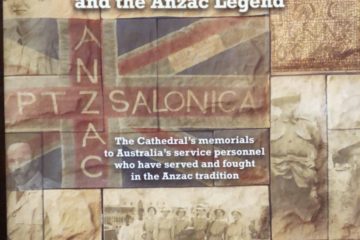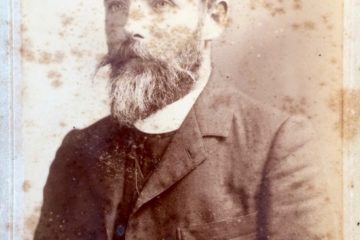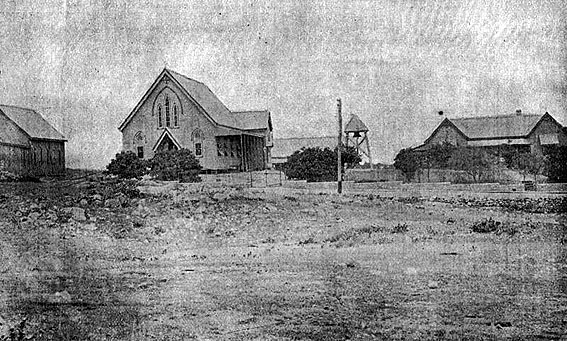Off to the Front

CHAPLAIN LIEUTENANT-
COLONEL GARLAND.
A FAREWELL
GATHERING.
AT the Coo-ee Cafe yesterday morning [ 12 October 1917 ] occasion was taken to bid farewell to Chaplain Lieutenant Colonel Garland [ David John Garland ], who is shortly leaving Australia on a visit to the troops.
Mr A. Leney (Town Clerk of South Brisbane) [ Alfred Leney ] occupied the chair, and testified to the high esteem in which the guest was held, and the valuable services he had rendered, especially in connection with recruiting.
Captain G.M. Dash (State Organiser of Recruiting) [ George Macdonald Dash ] mentioned the fact that Lieutenant Colonel Garland was the first organising secretary of the State Recruiting Committee, and that no one was better acquainted with the amount of work which the securing of men involved.
He remarked on the manner in which he had dedicated himself to the service of the Empire ever since the war began, and added a personal word of high appreciation.
Colonel the Hon. A.J. Thynne MLC [ Andrew Joseph Thynne ] spoke of the time when he was almost absolutely dependent on Canon Garland in getting the recruiting work into organised shape, and vouched that Canon Garland had continued his efforts.
He did not think the public or the soldiers at the Front and in camp had ever realised the exceeding obligation they were under to their guest. (Hear, hear.)
With his active mind, and his keen activity among the men, Canon Garland had been able to put his finger on things which even commanding officers had missed, and about which people outside knew nothing whatever.
He wished to make his adieu to him in the most cordial way possible, and hoped his enterprise would be eminently successful. (Applause.)
Mr J.J. Knight [ John James Knight ], supplementing the felicitations, described Canon Garland as one of his oldest friends.
He alluded to the guest’s one time “mania” for municipal reform, and confessed that after what differences there were between them he had always had the suspicion lurking in his mind that Canon Garland was right. (Laughter and applause.)
He was sure that officers and men at the Front would not be long in doubt as to Canon Garland’s arrival there, and was equally sure that the energy and enthusiasm that Canon Garland would put into his work, whatever it might be, would prove beneficial both to the military authorities and the men. (Applause.)
Mr John Adamson (ex-Minister for Railways) [ John Adamson ] also referred to differences he had had with Canon Garland in the past, and paid that gentleman the compliment of saying that he had always found him a square fighter, and one who had ever stood by the boys going to the Front, those at the Front, and those who had returned.
Messrs R.J. Morris [ Robert John Morris ] and J. Ure McNaught [ John Ure McNaught ] followed with tributes to Canon Garland’s worth, and the chairman then asked the guest to accept a photographic camera as a token of esteem from numerous friends
In responding, Chaplain Lieutenant Colonel Garland spoke of the occasion as one associated with many manifestations of personal good will.
He touched on the relationship which should exist between the social life of the community and the life political, and went on to say that he felt keenly today the manner in which Australia had broken her pledge to the boys at the Front.
The one paramount pledge was that given by the whole people that they would stand by them and send them adequate reinforcements, and he had always tried to do his share towards keeping that pledge.
He was going to the Front to look after the moral and social needs of the men, and this implied that he would be compelled to take up the stakes he had planted here.
God only knew whether he would return to drive them in again, or whether if he did return he would be able to drive them in, but however that might be their presence and encouraging words could be an inspiration to him and he would try to some extent to succeed in justifying their kindness, their friendship and their generous intentions towards him. (Applause.)
Before separating the company took a personal farewell of Canon Garland, wishing him godspeed, with the hope that an opportunity for a final goodbye would present itself.
— from page 15 of “The Brisbane Courier” of 13 October 1917.
PICTURED ABOVE: George Macdonald Dash, the Commonwealth Loan Organiser, had to thank his father, the late Rev. Edward Dash, for giving him a surname that fits his occupation to a “T”. With no influence whatever behind him but his own energy, initiative and method, he has come to be regarded as Australia’s greatest organiser and publicity man. He has been associated with the organising of over £200,000 of Commonwealth and State loans. Although a prominent Nationalist, he stepped into the breach and raised £2,000,000 locally in Queensland for Premier Theodore [ Edward Granville Theodore ] after the failure of the London mission in 1920. At first Hon. Secretary of the recruiting movement in the northern State, in October, 1916, he became Chief Military Registrar for Queensland in connection with ‘Billy’ Hughes’ [ William Morris Hughes ] now historic “Call-up”. Just how he got through on that memorable occasion is best shown by one of his most treasured possessions — to wit, a press cutting from the Labor “Daily Standard”, Brisbane, which complimented him on his absolute fairness to rich and poor alike, in the notorious Exemption Courts. For a time he was Chief Organiser of the Nationalist Party in Bananaland, but big George Dash has too much of the milk of human kindness in his soul to wage a bitter political battle with any personal friend of opposite party views, so be transferred his attention to war loan, and other non-political campaigns such as the Red Cross and soldiers’ relief funds. The Brisbane Diggers called on him at Xmas time, 1916, to try and raise £1,000 for them to feed the out-of-work Diggers’ wives and kiddies, who were right up against it, even for tucker. George who has four sons and six daughters of his own, was touched on a soft spot. In a whirlwind campaign which lasted only three days, he scooped in £2,000, and not a single Digger went hungry. In three States he has visited every town with over 200 inhabitants, and knows the other States nearly as well — in fact there are few men who know it better, outside the ranks, of the commercial travellers. A couple of years ago he bought an interest in a city newspaper in Brisbane, but the call of the loan campaigns still brings him to the headquarters of the Commonwealth Bank, in Sydney, for a few months each year. He has one of the most fertile brains in Australia – advertising ideas and organising schemes break out on him in the night like a rash, yet withal he is the coolest and most amazingly cheerful ‘big job’ man in the city. What is more, he takes just the same size in hats as he did before he commenced his meteoric rise in the organising world, ten years ago. The reason of his success he himself gives you in two words: “My wife”. Incidentally, Mrs. Dash is one of the handsomest and youngest-looking “mothers of ten” to be found south of the line. Hobbies: Putting his superfluous savings into the totalisator machine. Vices: Enjoying a “spot” with a few pals while he relates the “very latest”.
– from page 8 of Sydney’s “The Truth” newspaper of 23 March 1924.


